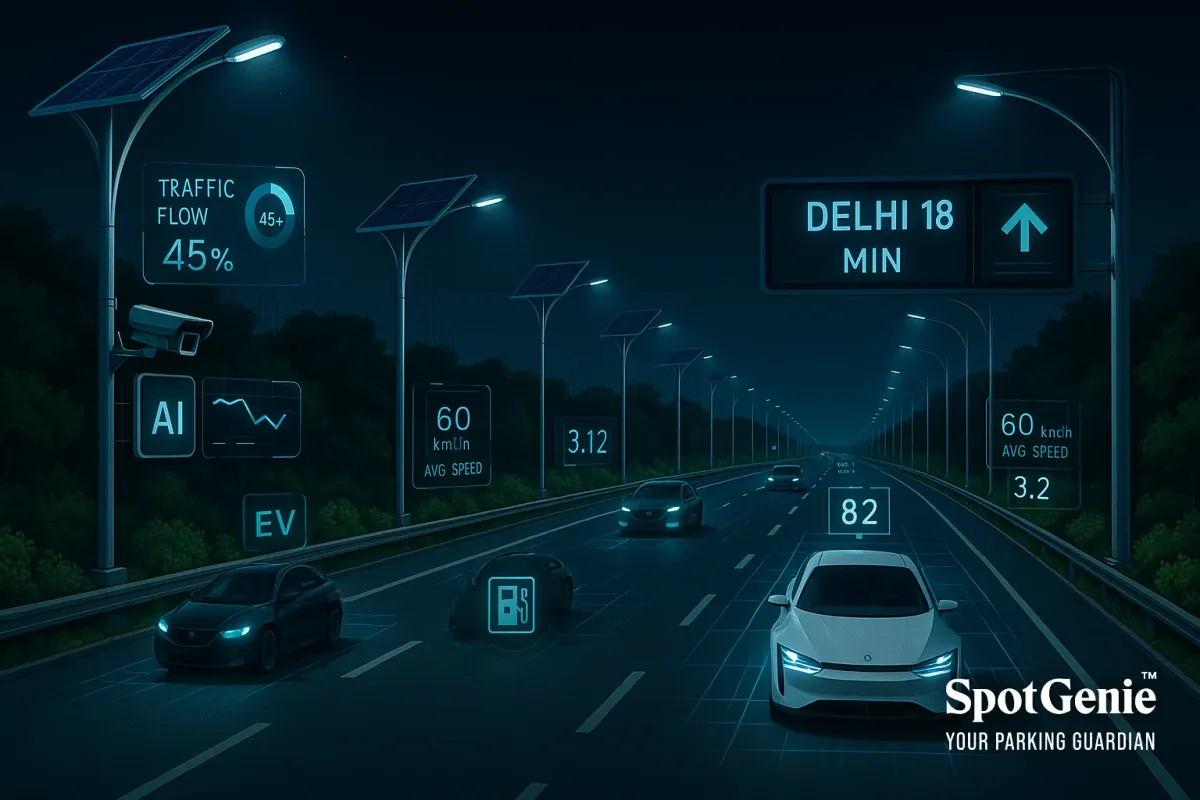Smart Highways: Technology & Sustainability on Indian Roads
Discover how India’s smart highways, from AI traffic systems to green infrastructure, are shaping the future of sustainable roads.

1. What Makes a Highway “Smart”?
Smart highways integrate advanced technologies, AI, IoT, sensors, and automation, to enhance safety, efficiency, sustainability, and user experience. These highways enable real-time monitoring, adaptive signaling, seamless tolling, EV support, and more.
2. Indian Innovations in Smart Highways
Delhi–Mumbai Expressway (E-Highway Initiatives)
- Set to pioneer dedicated EV lanes, in-motion wireless charging, and battery swap points, boosting clean logistics.
- Solar-powered lighting, rainwater harvesting, and plans for 4 EV-specific lanes make it a trailblazer.
Eastern Peripheral Expressway, India’s 1st Smart & Green Highway
- Operates with solar-powered lighting and rainwater harvesting.
- Equipped with highway traffic management and video incident detection systems (HTMS & VIDS), feeding into a 24/7 Central Control Room.
AI-Powered Traffic Management on Dwarka Expressway
- India’s first AI-driven Advanced Traffic Management System (ATMS) launched, capable of detecting 14 types of traffic violations in real-time.
MLFF: Seamless, Barrier-Free Tolling
- Multi-Lane Free Flow (MLFF) tolling introduced at toll plazas on Delhi–Chandigarh and NH-48 (Gujarat) for uninterrupted toll collection.
IoT Streetlights & Incident Tracking
- Tambaram–Tindivanam NH in Tamil Nadu deployed GPS-linked IoT-enabled streetlights and geofenced monitoring for emergency services.
Green Highway Corridors
- World Bank’s Green National Highway Corridors Project integrates eco-friendly construction (lime, fly ash, jute), along with slope stabilization techniques across multiple states.
- Meerut pilot road uses green infrastructure and is set for expansion across 12 more cities.
Smart Construction & Asset Monitoring
- Technologies like GPS-controlled graders, digital twins (e.g., Mumbai Trans Harbour Link), drone monitoring, and embedded sensors (e.g., Pune–Bengaluru highway) are enhancing quality, maintenance, and safety.
3. Safety & Sustainability on Smart Roads
- The Zero Fatality Corridor model on the Mumbai–Pune Expressway reduced fatalities by over 50% through engineering, enforcement, and emergency response improvements.
4. Why Smart Highways Matter
| Benefit | Description |
|---|---|
| Efficiency & Reduced Congestion | AI systems optimize traffic, minimize delays. |
| Safety Enhancements | Real-time incident response and violation detection cut accidents. |
| Clean Energy & Green Design | Solar lighting, rainwater harvesting, and eco construction reduce carbon footprint. |
| EV & Future-Ready Mobility | EV lanes, wireless charging, paving the way for clean transportation. |
| Digital Infrastructure Management | Predictive maintenance and real-time monitoring ensure long-term resilience. |
5. The Road Ahead
With expressways like Delhi–Mumbai, Eastern Peripheral, and Mumbai–Nagpur (Samruddhi) embracing smart infrastructure and clean energy, India is steering toward a future-ready highway ecosystem. Continued innovation and adoption could transform transport entirely.
Conclusion
Smart Highways are not just a technical upgrade, they're an infrastructure revolution blending technology, sustainability, and efficiency. As India drives into this futuristic mode, these roads are setting benchmarks for global transport infrastructure.
Follow us on:
🅾 Instagram |
ⓕ Facebook |
𝕏 X |
▶️ YouTube |
🟢 WhatsApp



